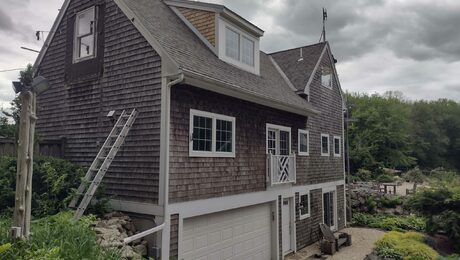*
I have a fairly thin (3/4″) slab on a laundry room to mud over an uneven and rough subfloor consisting of rough sawn joists and 1″ plywood on ledgers in between. The finish floor will be tile. The homeowner and I do not expect there to be any water on the floor at anytime, except if the washer connection fails. In such an event, I installed a floor drain.
At first, I wanted the substrate to be mud, but we are trying to keep the elevation low, consistent with the surrounding finish floors, so the deck mud will have to be about 3/4″. I generally like a mud substrate, as it stiffens up funky subfloors considerably. My thought was to use a latex additive to strengthen the mud, and trowel it fairly thin (3/4″) over tar paper and wire. I usually do 1″ or better deck mud substrates.
My tile supplier has suggested a new self leveling compound for tile. My experience with this stuff is that it used to be for only vinyl floors, and had a maximum thickness of about 1/4″. My supplier now tells me that they manufacture self leveling compounds for tile now, which can be poured as thick as 1″. He says that they are very easy to mix, and one just plugs the holes, dam the ends, and it will harden in a few hours.
Questions:
1. Is the Self Leveling Compound as strong as deck mud?
2. Do you need to reinforce it with lathe or wire?
3. Given a 3/4″ thickness, would you recommend deck mud or this self leveling compound for the tile?
Thanks in advance.



















Replies
*
I have used the stuff you talk of and it works great. BUT you have to work fast for it to level out fully. It is also very "wet" when mixed but do follow the instructions. if using more than one bag have a helper mix as you pour or it sets up too quick to keep the flow for level. you can pour it over wire mesh for extra stiffness.
*
I have a fairly thin (3/4") slab on a laundry room to mud over an uneven and rough subfloor consisting of rough sawn joists and 1" plywood on ledgers in between. The finish floor will be tile. The homeowner and I do not expect there to be any water on the floor at anytime, except if the washer connection fails. In such an event, I installed a floor drain.
At first, I wanted the substrate to be mud, but we are trying to keep the elevation low, consistent with the surrounding finish floors, so the deck mud will have to be about 3/4". I generally like a mud substrate, as it stiffens up funky subfloors considerably. My thought was to use a latex additive to strengthen the mud, and trowel it fairly thin (3/4") over tar paper and wire. I usually do 1" or better deck mud substrates.
My tile supplier has suggested a new self leveling compound for tile. My experience with this stuff is that it used to be for only vinyl floors, and had a maximum thickness of about 1/4". My supplier now tells me that they manufacture self leveling compounds for tile now, which can be poured as thick as 1". He says that they are very easy to mix, and one just plugs the holes, dam the ends, and it will harden in a few hours.
Questions:
1. Is the Self Leveling Compound as strong as deck mud?
2. Do you need to reinforce it with lathe or wire?
3. Given a 3/4" thickness, would you recommend deck mud or this self leveling compound for the tile?
Thanks in advance.
*
Yeah, the stuff is great for solving problems. I can't say it will work for your intended purpose though, because you are expecting a minimum thickness over a wood subfloor which you haven't supplied enough information about. What size joists? Joist spacing? Joist span? Ground, or upper floor?
The material in question, depending upon mfg, dries to something like 5500 psi. Avoid overtooling, follow explicitely the mixing instructions, work fast, have a helper mix for you if the floor requires multiple batches. Or, you can mix simultaneously all batches required. Be careful not to let it get away from you--it definitely can! I don't mean to scare you here, I just don't know your level of experience so I'm trying to cover all the bases.